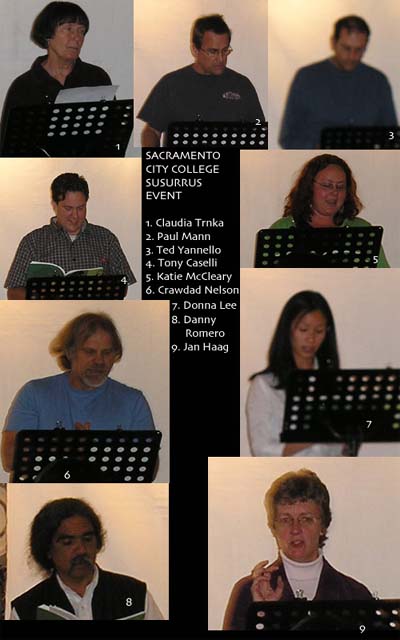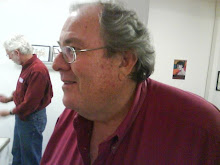
Sacramento City College celebrated the release of its periodical Susurrus at the Sacramento Poetry Center. Several past and current students who were contributors stood up to read their poems to the crowd of admirers who had decided to spend a beautiful Sacramento evening in a dimply lit room [Reminder: focus floodlight on podium] with those readers.
The first poem of the evening was read by Claudia Trnka. She read “1953,” a reflection on coming to terms with a woman’s body and a lament for the fact that no one had showed much concern for her sturdy legs as opposed to other body parts.
Paul Mann read a portion of his story “Millie’s House,” which Paul revealed at the reading was a story informed largely by the family of one of his clients. Paul is a defense investigator for inmates on California’s death row. The story is primarily about the experience of a middle class speaker going to meet Millie at her house in all its ramshackle glory and the attendant guilt that visits the speaker for being able to walk away from Millie’s misery.
Ted Yannello read Q.J. Hylton’s “Look Up,” a childhood suicide fantasy where the speaker looks up as he/she falls, unable to differentiate what will save or doom the speaker.
Katie McCleary informed the audience that she had an update to her contributor’s notes. Instead of planning to attend an undefined MFA program, she said she had been accepted into USF’s History and Consciousness program. Then she read “Toasted Heart,” a poem about the speaker’s tête-á-tête with a fiery female lover, complete with surgical detail.
The veteran Crawdad Nelson then read several pieces. One of them was for his brother and his “secret war against animals.” While Crawdad admitted he didn’t quite understand his brother’s passion for hunting, he acknowledged that any man’s passion is something to celebrate. He described his brother in the poem as hunting Bigfoot if he could.
Nelson then went on to read several poems from his series about the history of Mendocino County. “1867 Mendocino Reservation” told of how the fort [Fort Bragg presumably] had been built to preserve the timber interests of the new settlers even though the Indians who had lived there were told that it was built to protect them. The Indians on the reservation didn’t really understand the agrarian life they had been presented and Nelson depicted a poignant moment of one Indian prompted to “sell a hoe he didn’t need.”
“Todd’s Point” was an homage to the natural spirit and animus found at that location where the wind from the sea makes the ground shudder.
“1987 Piedmont Hotel” told the story of how s a diversion for arsonists to burn down the Piedmont Hotel while firefighters were busy battling the library blaze. The proprietor of the hotel was never formally charged, yet suspicions ran high. The man responsible, Nelson revealed, eventually died in prison, serving time for rape.
“1985 The Green Chain” was a reflection on the timber industry in Mendocino county, how it did not deserve the loyalty it was given by its workers as they were slowly displaced over the course of a couple of decades with finally the lumber mill shutting down for good in 2002.
By request, Nelson then read “The Sun Burns Us to the Ground” from Susurrus,, dialog with a city that keeps itself a little rough around the edges that drives its inhabitants to take up beautiful and instinctual acts of love.
Nelson finished his segment by reading from his new book ,My Ink, a piece entitled “What Do I Owe You?”
Donna Lee read “Dreaming in Chinese,” a piece inspired by the old bit of language-learning wisdom that one does not really know a language until one begins to dream in it. The speaker enters into a dialog with nature which reveals the tone of “Jia,” a character that means beautiful and connects to the concepts of family and home, which, presumably, the speaker has found in the US. The sea breeze acknowledges what the speaker has just mentioned.
Danny Romero read a student piece that was cut short to his battle with the lack of lighting and his resultant eye strain.
Jan Haag read student pieces by Marie Reynolds [“Faith”], a poem that settles on an abandoned barn, then the speaker follows a set of tracks that belongs to an unnamed other with the intimation in the last line where the tracks disappear “into the fractured earth” that the world is somehow a bit more ragged and treacherous than before.
Haag then read “Pear Williams Bosc” by Jerry Minamide, another short poem that compared a pear to a woman’s body that invites the speaker to take a love-bite (prelude to a kiss?) out of the voluptuous pear.
Finally, Tony Caselli finished the evening with a requested reading of his narrative non-fiction piece entitled “Missing Pieces” that gave a day-by-day description of his father’s and his own dealings with what Caselli prefaced as the scariest week of his life, the week his mother was diagnosed with cancer.





















No comments:
Post a Comment